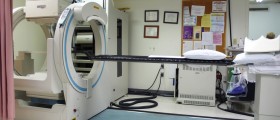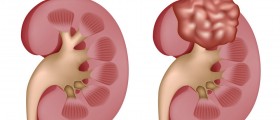
Lung cancer is a severe disease caused by uncontrolled growth of the cells in the lung. In most cases, those cells were once epithelial cells of the lungs, but their uncontrolled growth has caused lung carcinoma. It can be either small cell or non small cell lung carcinoma.
The symptoms which cause patients to consult their doctor are usually weight loss, shortness of breath and extensive coughing. Sometimes, patients even cough some blood.
Lung cancer is one of the deadliest and also with a highest incidence of all known cancers. When it originated in the lung tissue it is known as primary cancer. If it started somewhere else in the body and then got to the lungs, because of the metastasis, it is called secondary lung cancer.
Several risk factors have been identified so far. People smoking tobacco or even just exposed to the tobacco smoke, asbestos or air pollution have a greater risk of developing this cancer. There is also a genetic predisposition to lung cancer and patients having someone in the family with this cancer are more likely to develop the same condition.
Patients suffering from lung cancer have extremely high mortality. Even with the best of treatments, only 14% of all diagnosed lung cancer patients survive more than 5 years. Highest incidence of lung cancer death has been recorded in North America and Europe.
Diagnosing and Treating Lung Cancer
Chest X ray and CT scans are the most common diagnostic tools for the lung cancer. Sometimes, to establish the proper diagnose, doctors might need to biopsy the lungs.
The treatment might consist of surgery, radiation, and chemotherapy. Treatment is decided upon a type of a cancer, the degree of its spread (stage) and the overall health of the patient.
If the tumor is large, doctors might prescribe courses of chemotherapy and radiation, to shrink the tumor before surgery. Surgical procedures can be done as open or minimal invasive laparoscopic surgery and they include the removal of one lung (pneumectomy), removal of the lobe (lobectomy) or the removal of a part of the lung lobe (Wedge resection).
As any other surgery there are operative and post-operative risks. The patients could bleed, develop an infection, form blood clots or experience collapse of the lungs or damage to the healthy tissue.
Abroad Treatment
Lung cancer surgery and therapy are very expensive in the United States and many lung cancer patients decide to visit some other countries over the world to get the treatment. Mexico is known to have lung cancer medical experts, as well as India, and many Americans suffering from this type of cancer travel to these countries to be treated.
Medical tourism is also very developed in Turkey. Their hospitals are considered to be highly equipped and their medical staff to be exceptionally trained to treat lung cancer patients.

















Your thoughts on this
Loading...